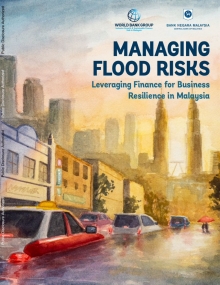 |
Managing Flood Risks: Leveraging Finance for Business Resilience in Malaysia The report unpacks the impact of floods on firms in Malaysia, and proposes solutions for policymakers and financial institutions to support SMEs and other vulnerable businesses to build resilience and mitigate flood risks. |
 |
Unleashing Sustainable Finance in Southeast Asia Key Findings | Download Report (pdf) The report emphasizes sustainable finance growth, but ASEAN-5's debt and equity markets must be revised for their sustainability objectives. The financial sector must adapt for adequate support, integrating sustainability into core decision-making. |
 |
Technologies and Solutions to Manage Plastic Waste in Small and Remote Islands: Using the Technology Options for Plastic Waste in Island Contexts (TOPIC) Toolbox for Islands in Malaysia Key Findings | Download Report (pdf) This study combines a global assessment of plastic waste management on islands with a review of existing technologies and their viability in island contexts to develop the Technology Options for Plastic Waste for Island Contexts (TOPIC) Toolbox, piloted on five islands in Malaysia. |
 |
Exploring Nature-related Financial Risks Launch Event | Download Report (pdf) | Press release A better understanding of nature-related financial risks is essential for prudential supervision to identify and address emerging risks in banks' and other financial institutions' loan books and investments. This report assesses the exposure of Malaysian banks to sectors and regions that are highly vulnerable to nature-related risks. This study makes use of both Malaysian and global data. |
 |
Non-Performing Loans in East Asia and the Pacific: Practices and Lessons in Times of COVID-19 Launch Event | Download Report (pdf) This report discusses the quality of loan portfolios in the banking sector of EAP jurisdictions and the principal vulnerabilities surrounding credit markets that may negatively impact the credit quality of banking portfolios and amplify the effects of the COVID-19 crisis. |
 |
Islamic Trade Finance: An Opportunity for Malaysia Launch Event | Download Report (pdf) The World Bank’s Islamic Trade Finance – An Opportunity for Malaysia report highlights ITF's substantial role in supporting trade, fostering growth, and accelerating post-pandemic recovery. In addition to its impact on the domestic economy, enhancing ITF can benefit other OIC-member countries and the global Islamic finance industry in which Malaysia is an established leader. |
 |
Market Study for Malaysia: Plastics Circularity Opportunities and Barriers Download Report (pdf) Mismanaged plastic waste has growing economic and environmental consequences. Malaysia is playing an active role at the regional level and setting ambitious national goals. This study addresses a critical need for a market assessment of the plastics value chain in Malaysia. |
 |
Malaysia’s Domestic Bond Market: A Success Story Download Report (pdf) This report focuses on developing Malaysia’s local bond market as a long-term local currency (LCY) financing source. |
 |
Malaysia - Islamic Finance and Financial Inclusion Highlights | Download Report (pdf) This report explores Islamic finance's role in furthering financial inclusion in Malaysia and draws critical lessons from experience. |
 |
Leveraging Islamic Fintech to Improve Financial Inclusion Highlights | Download Report (pdf) This report aims to evaluate the global developments in fintech solutions by Islamic financial institutions (IFIs) and their impact on financial inclusion within its core markets. |
 |
Pioneering the Green Sukuk: Three Years On Highlights | Download Report (pdf) This report covers the basics of what makes a green sukuk, a brief history of the developmental work leading to the first green sukuk, followed by an assessment of the green sukuk market to date, before concluding with some key challenges and opportunities and what this could mean for policymakers and regulators. |
 |
Developing a National Green Taxonomy: A World Bank Guide Press Release | Download Report (pdf) The publication will help regulators in emerging economies who seek to “green” their countries’ financial systems. |
 |
Case Study on the Employees Provident Fund of Malaysia Highlights | Download report (pdf) | Press release Malaysia's Employees Provident Fund (EPF) transitioned from a relatively small public retirement fund for private and non-pensionable public sector employees in 1949 to one of the most significant pension funds among developing countries. |
 |
Greenback 2.0 Johor Bahru Report: Migrant Workers' Remittances from Malaysia Download the report (pdf) “Project Greenback 2.0 –Johor Bahru” is the product of a partnership between the World Bank and Bank Negara Malaysia, aimed at supporting the development of an efficient and transparent remittance market. |
 |
Financial Inclusion in Malaysia: Distilling Lessons for Other Countries Presentation | Download report (pdf) Malaysia has achieved one of the highest levels of financial inclusion among Southeast Asia countries due to policies taking advantage of mobile phones and banking agents to expand access. |

